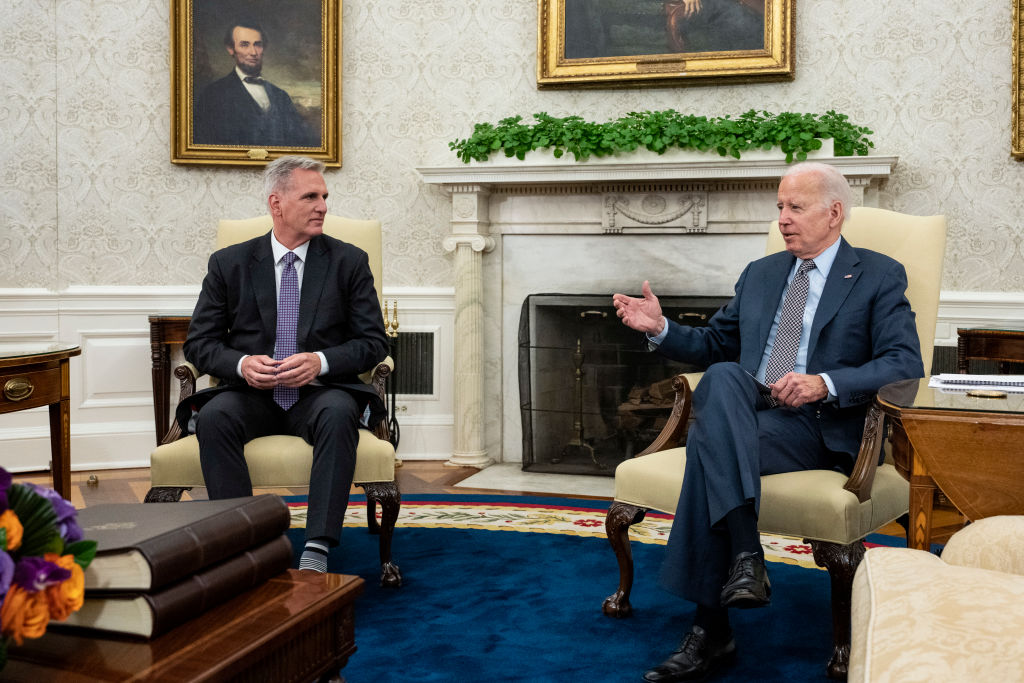Happy Friday! Neuralink—the company founded by Elon Musk to implant chips in humans’ brains—announced yesterday it had received FDA approval to begin clinically studying the technology in humans for the first time.
Good thing Ron DeSantis didn’t try to launch his campaign on that platform!
Quick Hits: Today’s Top Stories
- The Supreme Court on Thursday ruled unanimously in favor of 94-year-old Geraldine Tyler, whose home was seized and sold for a profit by a Minnesota county in 2016 to settle a small tax debt. “The taxpayer must render unto Caesar what is Caesar’s, but no more,” Chief Justice John Roberts wrote in the unanimous opinion, which dealt a blow to the controversial practice often referred to as “home equity theft.”
- Also on Thursday, the court ruled 5-4 to restrict the power of the Environmental Protection Agency to enforce federal clean water protections, particularly in the nation’s wetlands and other waterways.
- A 75-year-old Michigan man who in September shot an 84-year-old woman canvassing at his home for Right to Life, a pro-life organization, was handed down a sentence of 100 hours of community service and 12 months probation on Tuesday after pleading no contest to the assault. The woman, Joan Jacobson, survived the attack but received hospital treatment for a shoulder wound.
- Oath Keepers founder and leader Stewart Rhodes—convicted in November on a number of charges, including seditious conspiracy, for his role instigating the January 6 riots and seeking to disrupt the transfer of power—was sentenced on Thursday to 18 years in prison, the longest such term of any January 6 defendant thus far. The head of the Oath Keepers’ Florida chapter, Kelly Meggs, was sentenced to 12 years in prison.
- Investigators looking into Donald Trump’s handling of classified material since leaving the White House have reportedly learned that the former president and his aides carried out a “dress rehearsal” for moving sensitive documents around Mar-a-Lago, and that boxes of paper were moved by two Trump employees one day before FBI agents and Justice Department officials traveled to the Florida estate to retrieve the material. The actions, if verified, could justify an obstruction charge—and Trump’s lawyers have reportedly warned him to brace for an indictment this year.
- The Food and Drug Administration on Thursday formally approved Pfizer’s Paxlovid oral antiviral treatment for adults who contract COVID-19 and are at high risk for severe infections. The drug has been authorized for emergency use since late 2021, but now has full approval.
- After weeks of speculation, Republican Pennsylvania state lawmaker Doug Mastriano—who was at the Capitol on January 6, 2021 and lost to Democrat Josh Shapiro by 15 percentage points in 2022’s gubernatorial race—announced Thursday he will not run for Senate next year. The news likely clears a path for hedge fund executive and Army veteran Dave McCormick, who ran for Senate in 2022 but lost to Dr. Mehmet Oz in the Republican primary.
- In Arizona, Karrin Taylor Robson—a businesswoman who lost to Kari Lake in the state’s Republican gubernatorial primary last year—announced Thursday she will not mount a Senate bid in 2024. A spokesman for Lake told Dispatch Politics earlier this month he is “99 percent sure” she will enter the race for independent incumbent Sen. Kyrsten Sinema’s seat in the coming months.
- The Department of Labor reported Thursday that initial jobless claims—a proxy for layoffs—increased by 4,000 week-over-week to a seasonally-adjusted 229,000 claims last week.
X-Date Draws Nearer

Negotiating over the fiscal fate of the country can cause tensions to run high. “When you’re in meetings like this, look, let’s be honest, there have been a few f-bombs that have been thrown,” said Louisiana Rep. Garret Graves, a chief Republican negotiator in debt ceiling talks with Democrats and a known-prankster. “And I think that humor takes the edge off of that.”
Graves may need some compelling antics to get a deal over the finish line.
While debt ceiling negotiations appear to be moving forward apace, we’re only days away from a potential default. And some conservatives and progressives are already voicing dissatisfaction with potential compromises.
So, where do the negotiations stand? House Speaker Kevin McCarthy met with President Joe Biden on Monday for what both leaders described as “productive” talks, but they once again emerged without an agreement. Unnamed sources claim the two sides are near a deal that would include significant spending cuts, but public statements from negotiators indicate there are many unresolved differences.
America’s Next Top General
Gen. Charles “C.Q.” Brown is about to go from commanding more than 320,000 people and overseeing a more than $190 billion budget to commanding no one and spending his days giving some guy advice.
We doubt he’ll get bored, though, since “some guy” is President Biden and the advice in question is how to protect America amid threats from land, sky, sea, space, and cyberspace.
Biden announced Thursday he’s nominating Brown—currently head of the Air Force—to become chair of the Joint Chiefs of Staff when Gen. Mark Milley’s four-year term ends this fall. If confirmed, Brown will be the nation’s highest-ranking military officer, responsible for advising the president, Secretary of Defense Lloyd Austin, and the National Security Council on everything from specific combat operations to planning the future and budget of the military. He’ll command no troops but play a critical role in our continued response to the war in Ukraine—and China’s increasing aggression.
After some 40 years in the Air Force, Brown has broad experience in the air and cyber challenges that military leaders expect to take center stage in the next decade, particularly in countering China in the Indo-Pacific. An F-16 fighter pilot, Brown has commanded in Europe, the Middle East, and Asia. He managed aerial campaigns pushing back the Islamic State and—in long, classified briefings—helped convince Congress to accept plans to retire older planes to make room for new ones.
As chief of staff of the Air Force, he adopted the motto “Accelerate Change or Lose” and pushed for force agility. Brown has pushed to cut bureaucracy and empower lower level airmen to use their best judgment to execute commanders’ intent. In an August interview at the American Enterprise Institute, he acknowledged the difficulty of fully realizing this culture change—particularly among resistant senior leaders—and gave himself a “C” grade on the task.
The first ever black Air Force Chief of Staff, Brown was confirmed to the position by a vote of 98-0 just days after releasing a video addressing racial bias in the wake of the police killing of George Floyd. “I’m thinking about wearing the same flight suits, with the same wings on my chest as my peers, and then being questioned by another military member: ‘Are you a pilot?’” Brown said. “I’m thinking about a history of racial issues and my own experiences that didn’t always sing of liberty and equality.” He’s ordered reviews of gender and racial disparities in the Air Force.
Milley, the current chief, has struggled to maintain his job’s apolitical stance amid criticism from the right for “wokeness” and from the left for appearing with then-President Donald Trump during George Floyd protests. He’s also drawn attention to himself with unusually frequent media appearances. “I want America to know that the United States military is an apolitical institution, we were then and we are now,” Milley said at a 2021 press conference, referencing the 2020 presidential election. “Our oath is to the Constitution, not to any individual at all. And the military did not and will not and should not ever get involved in domestic politics.”
If confirmed as chairman, Brown may face similar cultural challenges. Some members of Congress blame falling recruitment numbers on aggressive efforts to rid the military of racism, sexism and extremism. Republican Sen. Tommy Tuberville of Alabama, for instance, complained in a recent interview that recruitment has dropped “because the Democrats are attacking our military, saying we need to get out the white extremists, the white nationalists.” (Tuberville later said he’d been referring to Trump supporters in the ranks painted unfairly as white nationalists.) And Tuberville has been blocking quick confirmation of hundreds of top military promotions to protest a Pentagon policy covering travel costs for service members and qualifying dependents seeking abortions.
Tuberville is also reportedly planning to slow Brown’s confirmation. Senate leaders haven’t burned the floor time that would be necessary to vote through all the blockaded promotions, but they may decide to hold a vote on Brown given the significance of the position for which he’s been nominated.
And Brown’s likely eager to get started: If confirmed, his four-year term would end in 2027—the year by which Chinese leader Xi Jinping has reportedly told his military to be ready to invade Taiwan. “I’d rather be uncomfortable than lose,” Brown said in March, touting his push to modernize and keep pace with growing rivals. “As airmen, we must think differently about what it means to fly, fight, and win.”
Worth Your Time
- In a piece for the Financial Times, Anastasia Sognei, Joe Leahy, and Yuan Yang report on a stalled Siberian oil pipeline that illustrates just how weak wartime Russia is. “Conceived more than a decade ago to help Russia ‘turn to the east,’ the pipeline through Mongolia to China was a way to diversify gas sales, bolster revenues, and give the Kremlin more diplomatic clout,” they write. “That project has taken on new urgency since the invasion of Ukraine, with Moscow seeking new outlets for gas that flowed to Europe before sanctions stood in the way. The hitch for Moscow is that Beijing—a crucial economic partner since the full-scale invasion of Ukraine—appears in no rush to engage. ‘Beijing has a history of prolonging negotiations to get a better deal,’ said Alicja Bachulska, a China policy expert at the European Council on Foreign Relations. ‘As Russia’s aggression against Ukraine has turned into a protracted war, Beijing believes that its bargaining position vis-à-vis Moscow can only get stronger.’ For Russia, the construction of the PS-2 is the only way to compensate for at least part of the EU market it has lost. But this means there is no particular incentive for China to agree to the new pipeline now.”
- After a 14-year streak of no fatal crashes by major U.S. airlines, the number of runway close calls seems to be increasing—and regulators are trying to figure out why. “If a pattern of serious close calls involving airliners at U.S. airports early this year keeps up, it would top any annual total of such incidents in more than two decades,” Andrew Tangel, Micah Maidenberg, and Alison Sider report for the Wall Street Journal. “Many industry officials worry that inexperience among pilots and flight controllers is compounding any problems. Starting in early 2020, airlines urged employees to take buyouts or retire early, and legions of experienced pilots obliged. Travel surged back much faster than they expected, and airlines struggled to replenish their ranks quickly enough. That has meant pilots are speeding through career milestones—getting pulled up from small regional carriers, from smaller planes to bigger ones, and upgrading from first officer to captain—more quickly than in the past. The FAA also struggled to bring on new air-traffic controllers, train them and continue training existing controllers who weren’t fully certified for the work.”
Presented Without Comment
The Hill: DeSantis Says He’ll Consider Pardoning Jan. 6 Defendants, Including Trump
Also Presented Without Comment
Washington Post: CPAC Treasurer Resigns, Alleges Financial and Staff Mismanagement by Matt Schlapp
Also Also Presented Without Comment
CNN: A Man Has Been Arrested After Shooting His Roommate During a Fight About Eating the Last Hot Pocket, Police in Kentucky Say
Toeing the Company Line
- In the newsletters: Nick argues (🔒) Republicans are, against all odds, winning the messaging war surrounding the debt ceiling.
- On the podcasts: The whole gang’s back together on the Dispatch Podcast to discuss the state of the Russia-Ukraine war after David’s return from Kyiv and engage in some rank punditry about DeSantis’ presidential announcement.
- On the site: Harvest unpacks Congress’ latest bipartisan attempt to tackle immigration issues and Paul Matzko breaks down the Supreme Court’s recent ruling on Section 230.
Let Us Know
Will there be a debt ceiling deal? If there is, will it have the support of a majority of House Republicans?









Please note that we at The Dispatch hold ourselves, our work, and our commenters to a higher standard than other places on the internet. We welcome comments that foster genuine debate or discussion—including comments critical of us or our work—but responses that include ad hominem attacks on fellow Dispatch members or are intended to stoke fear and anger may be moderated.
With your membership, you only have the ability to comment on The Morning Dispatch articles. Consider upgrading to join the conversation everywhere.